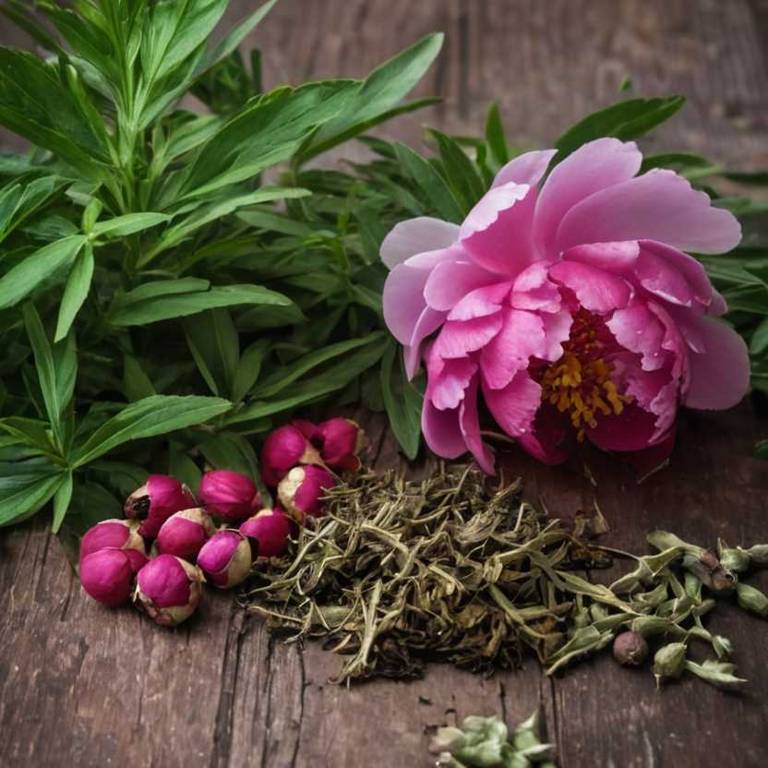Common Peony (Paeonia officinalis)
Common Peony (Paeonia officinalis) is a member of the Paeoniaceae family, native to Central Asia, Eastern Europe, and Southern Russia. Traditionally, its rhizomes, roots, and flowers have been used for decoctions, infusions, and poultices.
This herb is particularly valued for its anti-inflammatory, sedative, and tonic actions, and has a long history of use in european herbal medicine, traditional chinese medicine, and mediterranean herbal traditions.

Quick Facts / Key Information
| Common Name | Common Peony |
|---|---|
| Scientific Name | Paeonia officinalis |
| Plant Family | Paeoniaceae |
| Genus | Paeonia |
| Species | officinalis |
| Native Range | Central Asia, Eastern Europe, Southern Russia |
| Plant Parts Used | Rhizomes, Roots, Flowers |
| Primary Medicinal Actions | Anti-Inflammatory, Sedative, Tonic |
| Primary Traditional Systems | European Herbal Medicine, Traditional Chinese Medicine, Mediterranean Herbal Traditions |
| Historical Preparation Methods | Decoction, Infusion, Poultice |
Botanical Identity
- Scientific Name
- Paeonia officinalis
- Common Name
- Common Peony
- Synonyms / Alternative Names
- Common Peony, Chinese Peony, Turk'S Turban
- Plant Family
- Paeoniaceae
- Genus
- Paeonia
Botanical Description
- Growth Habit
- Perennial herbaceous plant.
- Height
- It typically reaches a height of 1 to 2 meters.
- Leaves
- Broad leaves with upper surface green and lower surface pale green, exhibiting prominent stomatal bands.
- Flowers
- Inflorescence consisting of solitary flowers with actinomorphic symmetry, five sepals, five petals, and numerous stamens arranged in two whorls, with flower color ranging from white to pink.
- Stems
- Cylindrical, woody, erect growth habit with simple branching, glabrous surface, and opposite leaf scars.
Traditional Uses / Historical Use
Traditional Systems
- European Herbal Medicine
- Traditional Chinese Medicine
- Mediterranean Herbal Traditions
- Japanese Kampo Medicine
Historical Preparation Methods
- Decoction
- Infusion
- Poultice
- Powder
Medicinal Actions
- Anti-inflammatory
- As described in traditional systems, a mild anti-inflammatory, in topical or internal use contexts.
- Sedative
- Historically regarded as a soothing sedative, in stress-related herbal practices.
- Tonic
- Traditionally described as a gentle tonic, for long-term use contexts.
- Carminative
- In herbal literature, noted as a moderate carminative, in digestion-focused applications.
Active Compounds
- Flavonoid
- A group of naturally occurring compounds commonly present in many flowering plants.
- Glycoside
- A broad class of compounds composed of a sugar bound to a non-sugar component.
- Phenolic Acid
- Naturally occurring phenolic compounds present in many plant species.
- Coumarin
- Organic compounds biosynthesized as part of plant secondary metabolism.
Modern Research Overview
Scientific literature concerning this plant spans multiple areas, including phytochemistry and laboratory research. Detailed analysis of published studies is not included at this time and will be added as part of future editorial expansion.
Safety & Contraindications
- General Precautions
- The use of this herb may warrant general caution in certain situations.
- Contraindications
- Contraindications related to this herb have been noted in traditional use and available sources.
- Allergies
- Sensitivity or allergy-related effects have not been clearly established.
- Drug Interactions
- Interactions between this herb and prescription medications are not clearly established.
- Toxicity
- Available information regarding the toxicity of this herb is limited.
- Pregnancy & Breastfeeding
- Use during pregnancy or breastfeeding has not been clearly established in available sources.
Preparation & Usage Methods
- Infusion
- A preparation method involving steeping plant material in heated water for a short period.
- Decoction
- Plant material is simmered in water to extract compounds from tougher parts.
- Poultice
- This method uses direct contact between plant material and the skin.
- Powder
- A preparation created by pulverizing dried plant material.
- Tincture
- A preparation involving soaking plant parts in alcohol for extended extraction.
Growing, Harvesting & Storage
Growing / Cultivation
- Soil
- Prefers loamy soil with well-drained conditions. Typically grows best in organically rich soils.
- Sunlight
- Thrives in partial sun. Tolerates full sun to partial shade.
- Watering
- Prefers well-balanced moisture levels. Tolerates moderate moisture fluctuations.
Medical Disclaimer
The information provided on this page is for educational and informational purposes only. It is not intended to diagnose, treat, cure, or prevent any medical condition. Always consult a qualified healthcare professional before using any herb for medicinal purposes.